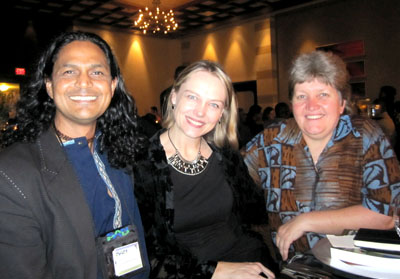Latest News Archive
Please select Category, Year, and then Month to display items
09 November 2018
|
Story Charlene Stanley
|
Photo Charlene Stanley
 Dr Tseliso Ntili, HOD of the Free State Department of Water and Sanitation, warns that pollution caused by mismanagement of municipal water-treatment works puts severe pressure on the province’s water security.
Dr Tseliso Ntili, HOD of the Free State Department of Water and Sanitation, warns that pollution caused by mismanagement of municipal water-treatment works puts severe pressure on the province’s water security.
“Despite our water challenges, Bloemfontein will never become a second Cape Town.” This firm assurance was given by Dr Tseliso Ntili, HOD of the Free State Department of Water and Sanitation, during his presentation at the recent regional seminar of the Faculty of Law’s Environmental Law Association.
The theme of the seminar was Water Quality and Water Security in Bloemfontein and was attended by staff and students from the Faculty of Law and the Faculty of Natural and Agricultural Sciences, as well as relevant role players from private, business, and government sectors.
Not enough water for city’s needs
Water restrictions in some form do seem to remain part of our future landscape though, as Dr Ntsili explained that the city’s current water yield of 218 megalitres per day still fell short of the demand of 259 megalitres per day.
Pollution and mismanagement at municipal level
He pointed out that a big cause for concern was that 75% of the Free State’s waste-water treatment works were dysfunctional. Housekeeping and security at these plants are often severely neglected. Yet, it is difficult for the Department of Water and Sanitation to act against offending municipalities.
“In intra-governmental disputes, the courts must be satisfied that organs of state have taken all reasonable steps to settle contentions – which can be a time-consuming process,” he explained.
Dr Ntsili said that the Caledon River System’s dwindling water levels due to low rainfall and siltation was also a concern, but that plans were underway to supplement the water supply to Bloemfontein via the Gariep Dam by 2026.
However, he warned that poor water management could drastically affect these long-term plans.
“If we can’t manage pollution, the cost will be high. Water security will be challenged, and we will have water shortages – not because of drought, but because of negligence.”
UFS academic completes SANPAD course
2010-09-09
 |
|
Mrs Tania Rauch-Van der Merwe of the University of the Free State completed the 2009-2010 South Africa-Netherlands Research Programme on Alternatives in Development (SANPAD) Research Capacity Initiative (RCI) on 3 September 2010. The programme entailed six modules over a seven-week period that was distributed over the course of one year. The RCI programme aims to prepare prospective Ph.D. students to successfully plan and perform their studies with the knowledge and exposure to a wide landscape of research methodologies within their respective fields and to complete the study within a reasonable time frame. Prof. Dennis Francis, Dean of the Faculty of Education, will supervise Mrs Rauch-Van der Merwe in her Ph.D. study pertaining to education for social justice and Prof. Theresa Lorenzo will be the co-supervisor. Pictured from the left, are: Prof. Francis (Dean: Faculty of Education), Mrs Rauch-Van der Merwe (Lecturer: Department of Occupational Therapy) and Prof. Lorenzo (Division Head: Disability Studies and Occupational Therapy, University of Cape Town).
Photo: Supplied
|